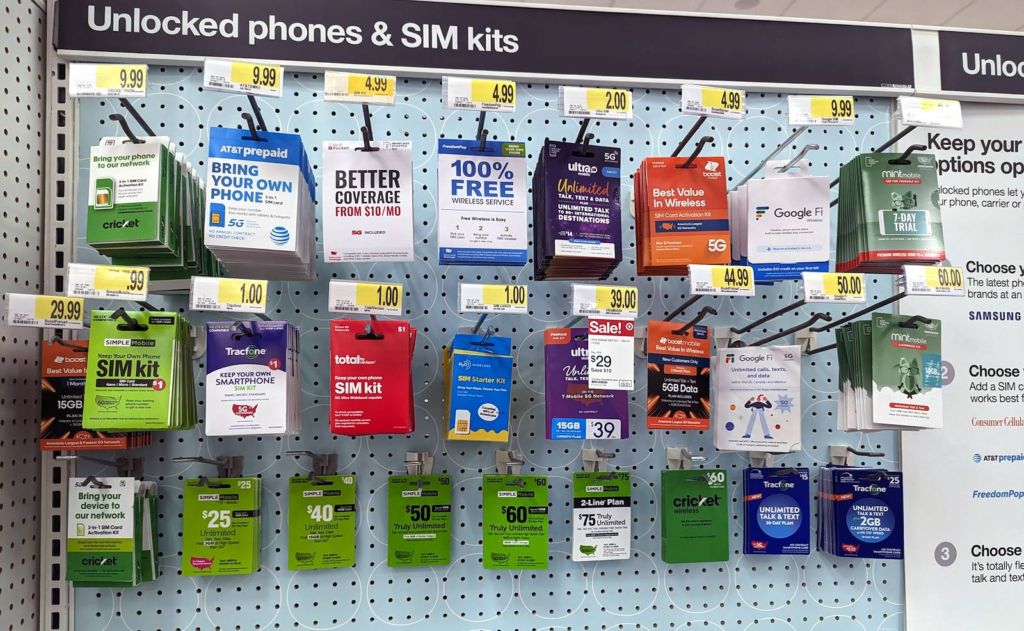
As I look at the calendar, the Holiday Shopping Season is now upon us and the December Holidays are less than two months away. Coincidently, I was asked this week by a friend if they should purchase their wireless service from a major carrier or go through an MVNO. I gave this a lot of thought as the line between the Big Three carriers and MVNOs is becoming more blurred. Yes, the MVNOs traditionally have been nimbler and faster acting than AT&T, T-Mobile and Verizon. Pressure from household names like Consumer Cellular, Mint Mobile, and Straight Talk (when it was actually an independent MVNO), as well as from Big Cable (Spectrum Mobile, Xfinity Mobile, and COX Mobile) with big advertising budgets and spokespeople like Ted Danson and Ryan Reynolds have forced the carriers to get more aggressive and innovative. And upstart MobileX now being available in over 1000 Walmart stores is a wake-up call to the entire wireless retail landscape.
National Retailers like Walmart, Target, Best Buy and others have the luxury of offering both options while exclusive, Authorized Retailers are locked into a specific brand.
Okay, So What Should a Customer Do?
The decision of whether to buy your wireless service through a major carrier or a Mobile Virtual Network Operator depends on your specific needs and priorities. Let’s take a look at advantages of each as outlined in a recent Chat AI discussion (and my comments).
Major Carrier:
- Network Quality and Coverage: Major carriers typically have their own extensive network infrastructure (true), which can provide better coverage, especially in rural areas or less populated regions. Hmmm…MVNOs use the same towers and the argument that the carriers provide “better” coverage is questionable at best. As far as I know, the only coverage benefit that the carriers have revolves around their roaming agreements with the other carriers, something MVNO customers can’t enjoy at this time.
- Priority Access: Major carrier customers often receive priority access to network resources, which can lead to faster data speeds during peak times. Mostly true. With their true Unlimited Data plans, costing upwards of $60-$105/month, MVNO customers are at a disadvantage when it comes to truly unlimited data.
- Customer Support: Major carriers generally offer more comprehensive customer support, including in-person service at retail stores, which can be helpful if you need assistance or have technical issues. With this I tend to agree. One could argue that Boost, Metro and Cricket’s customer service is just as good but remember, they are owned by DISH, T-Mobile and AT&T respectively. But then there’s also Consumer Cellular who has been opening branded stores in several states, and AirVoice Wireless has opened its first two branded stores in Texas. Both are non-carrier owned independent MVNOs
- Device Financing: Major carriers usually offer financing options for purchasing new phones, making it easier to upgrade to the latest devices. As now do the MVNOs, both directly with their customers and with third party vendors like Quality One and HTC.
- Family Plans: Major carriers may have better options for family plans, allowing you to save money by bundling multiple lines on a single account. Again, I would agree except for the carrier owned MVNOs mentioned above.
MVNOs:
- Cost Savings: MVNOs often offer lower prices for similar services compared to major carriers, making them an attractive option for budget-conscious consumers. With no infrastructure costs, this is the reason that MVNOs exist and can compete with the carriers. This and their differentiators to attract non “mainstream” customers
- No-Contract Options: Many MVNOs provide prepaid plans, giving you more flexibility and avoiding long-term commitments. While the carriers have also adopted a no contract philosophy, try porting out if you owe money on your “free” phone that is “on us” and you have signed a 24 or 36 agreement on your handset.
- Customizable Plans: MVNOs often allow you to select and pay only for the features you need, which can be more cost-effective if you don’t require all the bells and whistles of a major carrier plan. Absolutely what sets MVNOs apart from the carriers. Differentiation, customization and able to react quickly to their customers’ needs is a big plus for MVNOs.
- Same Network Quality: MVNOs use major carriers’ networks, so you can enjoy similar coverage and quality of service without the higher costs. AGREE 100%!!
- SIM-Only Plans: MVNOs make it easy to bring your own device, which can be a great option if you already own a compatible phone. Carriers really, really want you to purchase a new handset and will do everything that they can to upgrade you to the newest, greatest phone, locking you in for another two to three years onto their network. Non exclusive dealers offer a large array of SIM only options that benefit those on a budget or who want the flexibility of prepaid to change when THEY decide to.
- Niche Plans: Some MVNOs offer specialized plans or cater to specific demographics, such as seniors, international travelers, or data-only users. As I’ve stated a thousand times, MVNOs need a DIFFERENTIATOR! When I speak to potential MVNOs, I ask a very simple question; “why would I leave my current provider to come with you? If they can’t answer that basic question, I wish them good luck and politely move on.
To make an informed decision, consider your specific needs, budget, and geographic location. If network quality and coverage are essential and you’re willing to pay more for premium service, a major carrier might be the better choice. On the other hand, if cost savings and flexibility are a priority, an MVNO may be the right fit for you. It’s a good idea to compare plans, read reviews, and check network coverage maps to determine the best option for your circumstances. Or better yet, drop me a line at atriumunlimited.com and we’ll be sure to steer you in the right direction.
Good Purchasing!
Jon
